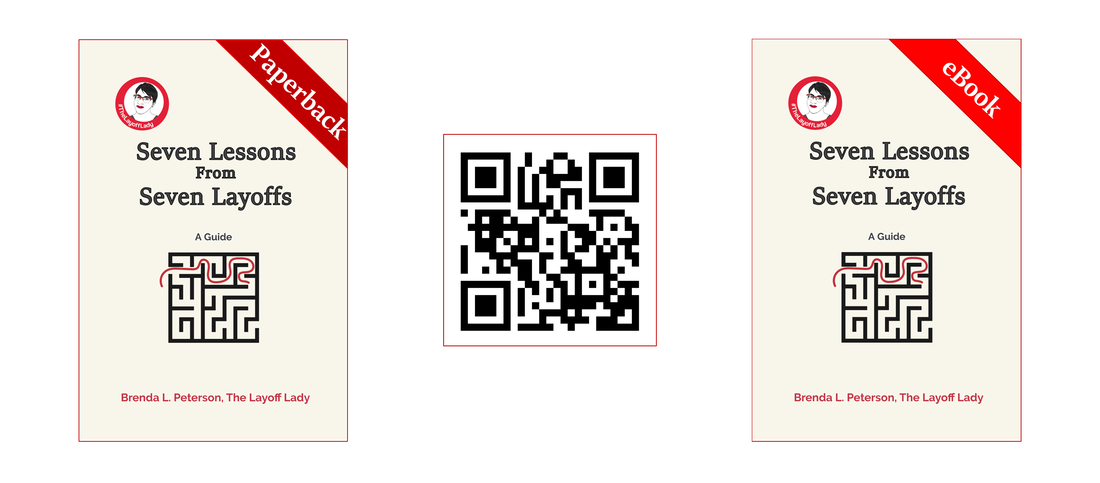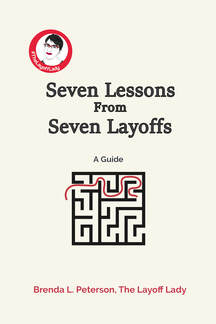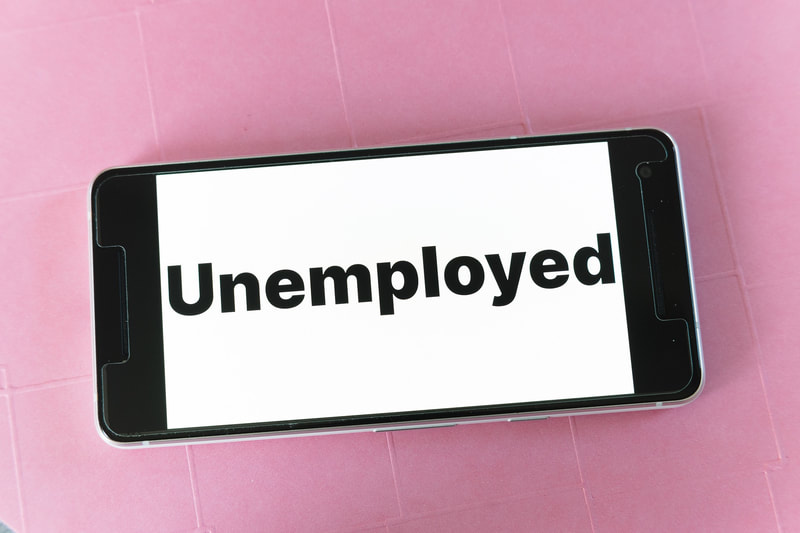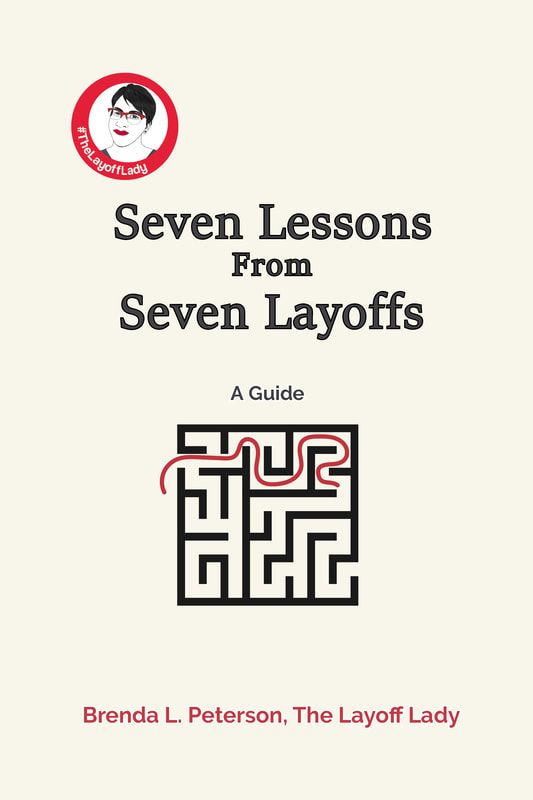|
By Brenda L. Peterson, The Layoff Lady All The FeelsWhether due to an economic downturn, an acquisition, or a company reorganization, layoffs hapen all the time. Each person will experience a range of emotions when it happens to them. Even for someone who has gone through a layoff before, it is a tumultuous experience each and every time. Here is the good, the bad, and the ugly of the feelings people often experience surrounding an unplanned job loss. ShockThe phone call from HR, the perp walk through the office to the dreaded conference room, the last-minute ominous meeting invite, or the oddly timed tap on the shoulder all seem to come out of nowhere. There is something surreal about being pulled into a virtual or in-person room and having someone look you dead in the eye and tell you that you are going to go through a significant life change starting, well, now. Even if there were layoff rumors, news about leadership changes, or low sales reported for the quarter, it’s always a surprise on the date and time when layoffs go down. It’s the feeling of the ground being pulled out from under you. It’s the gap between expecting a full day of meetings and finding yourself in your car mid-morning with a white box. AngerEven if you were actively looking for a new role, a certain amount of anger goes along with a layoff. It could be frustrating learning about the people who didn’t get laid off (like that guy whose messes you've been cleaning up for the last year) and comparing your perceived value to theirs. It could be irritation at the timing (right after vacation, right before a holiday) and how that makes finding something new an even longer process. It might be the insult to injury when you realize that yesterday’s mission-critical work-all-night project has become irrelevant. In many cases, it might just be the maddening nature of someone else deciding when you don't get to do that job anymore instead of you getting to choose when it was time. Feeling that lack of control can be the most challenging part. SadnessExiting a job abruptly leaves a big hole in your life, starting with a 9+ hour workday being replaced with dead air and uncertainty. People who earlier that day were coworkers, casual work friendships, or confidants now may be nothing at all now that you no longer share an employer. The consistency of a morning routine, daily commute, and regularly scheduled meetings are replaced with a battle with the unknown that may last a week or a year. Sometimes, it’s easy to be hopeful about the future, and other times, it’s hard not to be mired in sadness about all the things you can’t control. FearThere is plenty to be afraid of. First, the idea of not having a paycheck is horrifying. Not knowing how long your severance check has to last is unnerving. Not having any idea how long your jobless period will last and what job you’ll end up with is sometimes unbearable. You may fear being unemployed endlessly and not being able to support yourself. You might worry about panicking and taking the first job offered to you. You could worry about holding out for something closer to the “perfect” job that may never come. You may even fear you will never get a job as good as the one you just had. On the worst days, when fear has given way to full-on catastrophizing, you could worry that you will lose your house, car, professional reputation, and everyone you've ever loved. ReliefHere's the one that might seem unexpected. If you've been at a company and "made it" through multiple rounds of layoffs, you may be waiting for your luck to run out. While you're certainly relieved to still be employed, each time you hear rumblings about reorganizations or start seeing those empty white dots pop up on Microsoft Teams, you may have had that sick feeling in the pit of your stomach waiting for it to be your turn. The strange benefit of finally being laid off is that you don't have to worry if it will happen (and when) because it just happened. At that moment, you also realize it's not as bad as you imagined, and now what there is to do is pick yourself up and create your fantastic new future. The Good NewsThrough the tumult of emotions, it’s important to acknowledge each one and process those feelings. From there, you can think about what is next for you and focuson your next steps toward the next right job for you. Learn More
0 Comments
By Brenda L. Peterson, The Layoff Lady About The Seven Layoff LessonsThrough my seven layoffs and many conversations with others in post-layoff career transition, I have learned seven core lessons:
About Lesson One: Experience Your Emotions and Manage Your Mindset.Right after a layoff, people often act hastily out of sheer unbridled panic. Instead, you must attend to two key tasks right away: feeling your feelings and choosing your career transition mindset. Getting your head on straight before springing into action will prepare you for the challenges ahead. Let’s look at a few key components of this lesson. Experiencing Your Emotions Losing your job, even through no fault of your own, will bring on a myriad of feelings. When someone asks you how you are, you may say “fine,” and you may even think that you are, indeed, fine. In truth, you are pretty far from fine, and you may not be truly fine for a good long while. Right after a layoff, your mind will be spinning as you process what just happened and figure out what on earth to do with yourself next. Your dominant emotions may include shock, anger, sadness, fear, and possibly even relief. As your career transition continues, you’ll cycle through those emotions as you hit ups and downs. At every step of the way, you’ll also experience more people telling you no than at any other time in your life. Through all of these feelings, it’s important that you acknowledge each one, and work your way through them. Managing Your MindsetYour mindset is your overall approach to dealing with the world. It includes how you think about your current situation, including your assumptions about what is true. When people search for a new role, successful people believe that the future will be good while also acknowledging that there will be challenges along the way. Adopting a mindset that combines optimism and realism will help you weather the challenges you’ll face. Changing your language to support your updated mindset will help you stay motivated, no matter how long your search lasts. You Are The CEO of YouAlong with your mindset, it’s helpful to change how you think about work. Instead of thinking of yourself as an employee who has to do whatever their employer asks or else, you need to give yourself a life promotion. In reality, your career is your business, and you are the CEO of You. Just like the executive team at a company needs to make tough decisions for the organization’s greater good, you need to make business decisions that are in the best interests of you and your household. For The Whole StoryFor all the information on each of the seven lessons pick up a copy of my book Seven Lessons From Seven Layoffs: A Guide. Learn MoreBy Brenda L. Peterson, The Layoff Lady Layoffs Happen All The TimeIt starts like any other day. Then, it takes an ominous turn. Whether you were invited to an ambiguously titled last minute meeting, received an awkward email in your personal email notifying you of your last day, or are perp walked to HR on your first day back from vacation, you are now among the newly unemployed. Welcome to the suck. Now What Do I Do?Even if there were buyout rumors, a quarter with low sales, or a new company direction, being part of a reduction in force (RIF) is still surreal when it happens to you. It's hard to know what to do with yourself when you find yourself unexpectedly out of the job. It's time to redirect your attention. Your New Focus AreasThe work problems you had an hour ago are gone. Along with your freed-up future come very different challenges. It’s time to shift to these top three focus areas:
Your Guiding PrincipleAlong with your new focus areas, your overall guiding principle is not to do anything counterproductive (or downright dumb) as you figure out your post-layoff next steps. Your Never-Do List Here are the career-limiting moves that will make your life harder. Instead of springing into action, stop, think, and then just don't do the following:
Your Think-Before-You-Consider-Doing List Here are a few things you may want to do at some point, but that require thought and a plan before you move forward. At the very least, sleep on it before you do any of the following:
Now that you are at least somewhat inoculated against creating utter chaos for yourself, let's get back to those top three focus areas. Focus Area 1: Process Your EmotionsLosing your job can be an emotional roller coaster. An unplanned job change is a stressful life event on par with getting divorced or going to prison. Just like dealing with a death in the family, you’re dealing with the death of the future you thought you had. Losing that imagined future is a significant loss that needs to be addressed. Figure out how you will cope with these changes. While distracting yourself from the unpleasant parts of the process is natural, building healthier coping mechanisms, like prioritizing self-care, is better for your long-term success. While you can get away with avoiding your feelings for a while, eventually, you need to acknowledge each one so you can move on. If you don’t work through those difficult emotions, your ignored feelings will come out sideways at just the wrong time. It is better to work through your grief privately than to fall apart during an interview or snap at someone who is trying to help you. Step 2: Review Your FinancesDisclaimer: While I know quite a bit based on my previous work experience supporting financial coaches, my own research, and my personal life experiences, I do not currently hold a license or certification to give financial advice. Therefore, the information provided here is educational information provided as guidance. I hope you can glean value from my lessons learned. Feel free to take my recommendations or not—but whatever you do, double-check my information (and everyone's facts, for that matter). This is your life, and you will care more about your finances and health care than anyone else. With that, read on. Possible Money From Your Former EmployerAlthough your paychecks will eventually stop, you will receive your final paycheck, possibly vacation time that you have earned and, hopefully, a lovely parting gift from your former employer in the form of a severance package. Severance could be equivalent to a set number of weeks of pay or include an additional lump sum, continuation of some benefits, and job placement services. In most cases, employers do not have to give you any type of severance. If you are eligible for a severance package, you will need to sign something before receiving that money. Once you sign, any thoughts you might have about legal action regarding your employment with the organization are pretty much over. Read the agreement given to you, consider having a lawyer look it over, and ask for clarifications (and any revisions) before signing it. After that, there is typically a waiting period before you receive that money. I also encourage you not just to sign whatever paper they put in front of you. Make sure you advocate for yourself. Unemployment IncomeAfter a layoff, most people will be eligible for unemployment insurance income, or UI. I encourage you to apply for unemployment payments. The money used to make unemployment payments comes from the payroll taxes that employers pay. That money is intended to help people who have been laid off to pay their bills as they search for something new. Unemployment payments are administered at the state level and vary by state. After you apply, there may be a waiting period before you receive a payment. Your state will also outline the amount of each payment you will receive, the number of payments you are eligible to receive, and additional factors impacting your payments. You may also qualify for job search support services and even programs to help you upgrade your skills. In short, apply for unemployment income right away. In most cases, there is not a good reason for most people to forgo unemployment payments. A Note About Health InsuranceSince many people rely on their employers for health insurance coverage, consider how you’ll cover healthcare costs. If you have a spouse, domestic partner, or parent who can bring you onto their health insurance, that may be your best option. Check with the other person’s employer and let them know you no longer have health insurance through your employer because of a layoff. Their employer can talk you through your next steps and cost changes. If that's not an option, consider COBRA coverage through your former employer. This means you could stay with your previous health insurance, but now you'd pay the whole premium cost. Brace yourself when you see your new premium amount because it is usually A LOT more than you spent as an employee. Another option is going on the insurance exchanges at Healthcare.gov to find coverage. You may even be eligible for a subsidy to offset the cost. Alternatively, for less expensive coverage intended to cover a big expensive medical issue should it happen, short-term health care insurance may be a good interim option. Do your research and determine what makes the most sense for you and your household. Step 3: Prepare For Your Job SearchNext, plan to launch your search for a new job. Start by thinking about what kind of job you want. Write down job titles, possible employers, and your target salary range. Update your resume to include details about your last position and showcase your unique skillset as it aligns with your target job. From here, start letting people know your new status of being “in transition” and ask for help. They might be able to introduce you to a valuable business contact, keep an eye out for job openings that meet your needs, and introduce you to a hiring manager looking for someone just like you. It Will All Work Out. It May Also Take A While.All told, I’ve had seven workdays that started with lots of obligations then quickly evaporated into unemployment. The good news is that it will all work out. The bad news is that there is a lot of uncertainty between your last day of work and your first day of your fancy new job when it does arrive. Using these tips will set you right as you begin your career transition. Seven Lessons From Seven Layoffs: A GuideIf you've recently been laid off, check out my book Seven Lessons From Seven Layoffs: A Guide. You can even buy the eBook to get help right now. In this book, I cover seven lessons from my seven experiences with unplanned job losses. I include my personal stories alongside practical advice for navigating this tumultuous time. You'll learn strategies for managing your mindset, finding the next right job for you, shaping your career story, and overcoming setbacks. Learn Moreby Brenda L. Peterson, The Layoff Lady 'Tis The SeasonOf my seven total layoffs, three began with my role being eliminated in the fall and ended with me starting a new job well into the new year. Being in a career transition always has rough patches. Being in a career transition during the holidays—especially the week before Christmas through the first full work week of January—is soul-sucking. I’ve read several articles touting the benefits of job searching during the holidays--and I mean a lot, a lot of them. (No one else will be applying! You’ll get a leg up on other applicants! Tons of people are trying to fill positions before the year's end!) I'm sure somebody somewhere found the role of a lifetime the day after Christmas interviewing with the one HR rep who was out of vacation and stuck working. I am not that person. I'm also not going to make the mistake of trying to be that person ever again. The Hiring Process Takes TimeMy shortest period of post-layoff unemployment was 50 days. In that time, I discovered the opportunity, applied for the role, had a phone screen, interviewed with the hiring manager, met with the hiring manager's boss, had an interview with the team, received an offer, negotiated the offer, waited for the background check, and then started. During this entire process, I had an interview each week. We started talking in mid-March, when no one was on vacation, and there were no major holidays. Holiday Hiring ChallengesNot even considering each organization's busy season, making progress on finding a new job in December is challenging. In addition to whatever year-end tasks need to happen, people are also focusing on holiday parties and family commitments, and sometimes using their vacation so they don't lose it. Unfortunately, focusing on getting people through the hiring process ranks lower on that full priority list. The Darkest Job Search TimeIn my experience, the absolute worst weeks for job searching are the last two weeks in December, with the very first week in January still being very slow. Then, as if by magic, on the first Monday of the first full workweek of the year, the world starts moving again. Those last two weeks in December can be downright brutal if you're trying to continue job searching. Possible referrals will suggest you wait until people are back in the office. The HR person you might manage to talk to is likely the one with the least vacation who is not hiring for the role that interests you most. You may also find that you'll get next to no good news and instead get a lot of long-overdue "we regret to inform you" emails confirming that you did not get that job you applied for several months ago. My Holiday Job Search AdviceHere is my advice to job seekers at the end of the year. Take a break from pounding pavement on your job search, and just breathe. Stop applying for a week or two. This break will do you good. Instead, take some time for you. Go do a few things you enjoy but don't always take the time to do while you are gainfully employed. Go to a noon yoga class. Get together with friends for lunch. Read a novel with no obvious professional development benefit. Go to a matinee. Visit a museum. Take a road trip. Walk around the mall on a weekday. Buy fancy coffee in a café and people watch. Whatever it is, do some things that bring you joy. Just like we all need vacation time to recuperate from our day jobs and be able to do good work, we also need to take a break from a job search so we can have the mental space to regroup. If you want to do something for your job search, revisit what you want in a new role and ensure your goals are still the right ones. Then, you can move forward and have more success in the new year. Learn More
By Brenda L. Peterson, The Layoff Lady Rejection and Negative EmotionsBeing jobless post-layoff and searching for a new role is a rough process riddled with rejection. It starts with your former employer kicking you out of the whole company and, in essence, saying, “You are no longer one of us.” At every step of the way, you’ll experience people telling you no in a variety of ways. Here is how that rejection may look. Applying for a job and:
Having what felt like a great interview for a job and:
Receiving a job offer and:
Accepting a job offer and:
The Necessity of Experiencing Your Emotions Because of all of the uncertainty and rejection, this whole process can be a lot to bear. It’s hard to keep going when there are obstacles at every turn. Sometimes, even well-intentioned people trying to be supportive ask just the wrong question and make you feel even worse. Often, I find that when people are exceedingly negative, they usually have not taken the time to address their emotions. Consequently, those hard feelings fester, come out sideways, and interfere with the business part of job searching. Their complaining comes from a place of fear, pain, sadness, and anger. Unfortunately, as with much of life, it’s nearly impossible to complain your way out of your current situation and into a better one. Instead, it’s paramount that you experience your emotions, then manage your mindset so you don’t let your feelings make the already complicated process of finding a new job even harder. Coping StrategiesHere are a few ideas for strategies to help you work through the unpleasant emotions that will pop up during your career transition. Acknowledge Each EmotionBefriend your feelings. Don’t pretend that you don’t feel how you do. Name them, acknowledge them, and then move on. Pretending those unpleasant feelings don’t exist will not make them disappear. Instead, it may silence them for a bit, but they will pop up later, usually at the worst possible time. Acknowledging each one will help them run their course–and also help you to increase your ability to manage those feelings. Wallow a Little It’s impossible to will yourself into feeling better. Sometimes, you need to just sit with an uncomfortable feeling for a while and let it run its course. Cry a little. Rewatch your favorite movie for the bijillionth time. Have a little ice cream. Do a puzzle. Take a walk. Take the afternoon off from your to-do list. Some will run their course a bit more quickly than others. Research The ProblemIf you’re worried about something, researching answers and managing your expectations often helps. How many job applications does it typically take to get an interview? How long does it take most people to find a new role post-layoff? Which companies are hiring? You'll probably feel a little better by researching options, clarifying goals, and taking useful action. Even if you don’t find a complete solution, you at least know more. Having added knowledge will help you worry less or at least direct your worry toward taking productive action that will help you solve a problem. Take a Social Media BreakSocial media, specifically LinkedIn, can be a great job search tool. Unfortunately, it can also give you the illusion that everyone else is doing great and you are downright hopeless. Posts like “It only took me a week to find my dream job,” or “I’m still employed but I feel SO BAD for my former coworkers who are jobless,” or “Every company ever is doing more layoffs” will only make you feel worse. Remind yourself that social media isn’t real life and disengage. Leverage Basic Self CareWhen everything feels hard, taking care of yourself needs to be one of your top priorities. Here are a few quick and easy ideas to make you feel almost instantly better:
Learn MoreBy Brenda L. Peterson, The Layoff Lady Managing Curious and Well-Intentioned PeopleOne of the hardest things about being laid off is telling other people about it--specifically fielding their uninvited questions. I'm not talking about work people or your professional network, either. I'm talking about the family friend you run into at the grocery store, that parent you went to a PTA meeting with once and the neighbor you seldom see. Worse yet, it is interacting with a group of well-intentioned people who express their curiosity, worry, and opinions regarding your well-being. Here are a few suggested talking points for managing those conversations that pop up at just the wrong time. Getting Your Patter DownAfter you've chatted with your inner circle--those people with whom you share your raw and uncut thoughts, feelings, and worries--it’s time to think about how you talk about this with all the rest of the people. It is those people who make random comments, who don't really know how layoffs go, and who might be trying to be helpful or supportive or to give you advice on a situation that is foreign to them. These conversations may be rough for you, especially if you're feeling vulnerable. Your goal may be to get through the awkwardness and move on to other topics. To prepare, it is helpful to have an idea of how to respond. Here are a few suggestions for talking points to get you through. Talking About Your Current State and Plans
Talking About The Job You No Longer HaveThe question: I heard you’re unemployed. What happened there! Your core message: My job ended. It is a thing that happened.
Talking About What Is Next For YouThe question: What are you going to do now? I would be freaking out. Or I’d be scared to death if I were you. Are you sure you’ll be okay? Or A person I sort of know lost their house/was unemployed for years/had to take a pay cut/never worked again. Your core message: I’m going to keep on living and also look for a new job.
Talking About STILL Not Having a JobThe question: So--do you have a job yet? Or Are you STILL unemployed? Or Did that thing you were interviewing for work out? Your core message: I am job searching and something will work out.
Acknowledging People's ReassurancesThe question/comment: Don’t worry. It’ll be fine. Hang in there! You’re so talented! Your response: Thanks. Addressing Well Intentioned and/or Awful AdviceThe comments:
Learn More
|
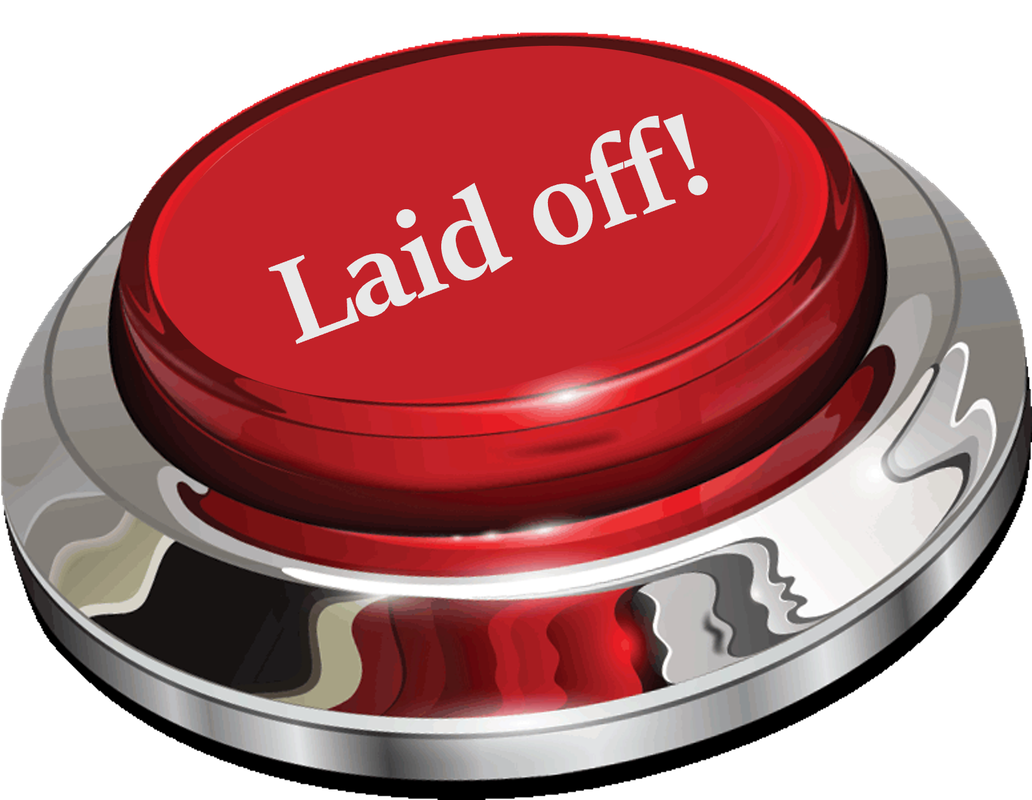
Just get laid off?
Click here for info on what to do first. Author7-time layoff survivor Brenda L. Peterson, The Layoff Lady, waxes poetic on layoffs, job transitions, & career resilience. Buy The Book!Were you recently laid off from your job and need a roadmap for what's next? Pick up a copy of my book, Seven Lessons From Seven Layoffs: A Guide!
Categories
All
Archives
July 2024
|





